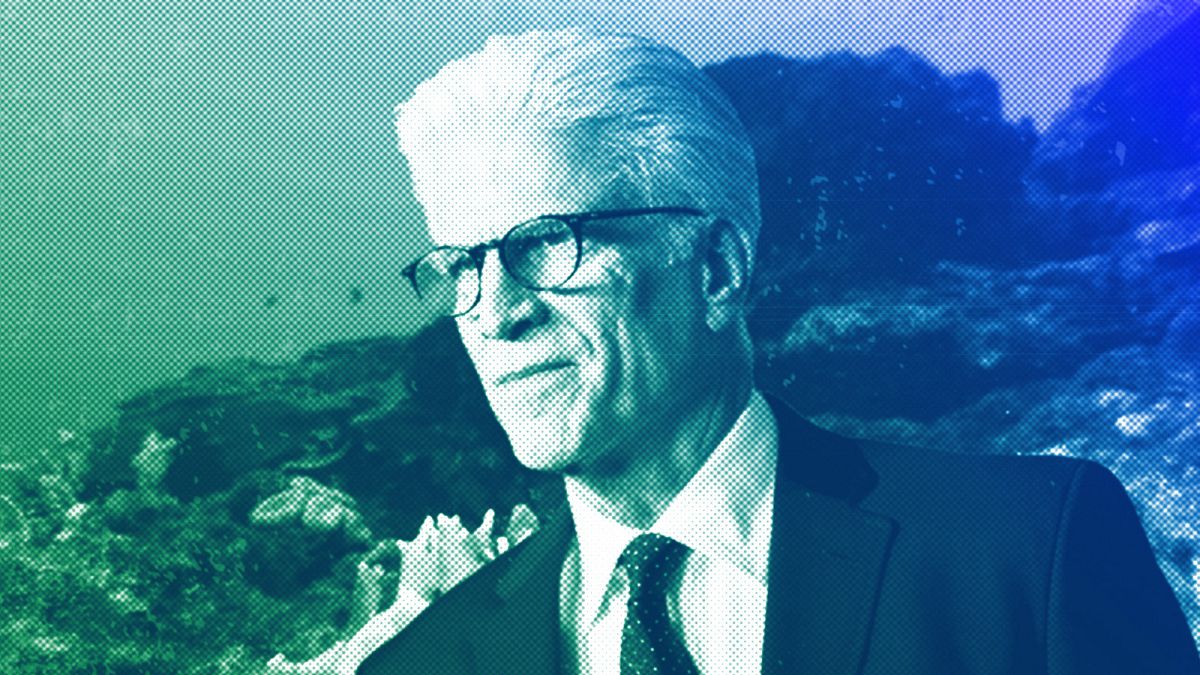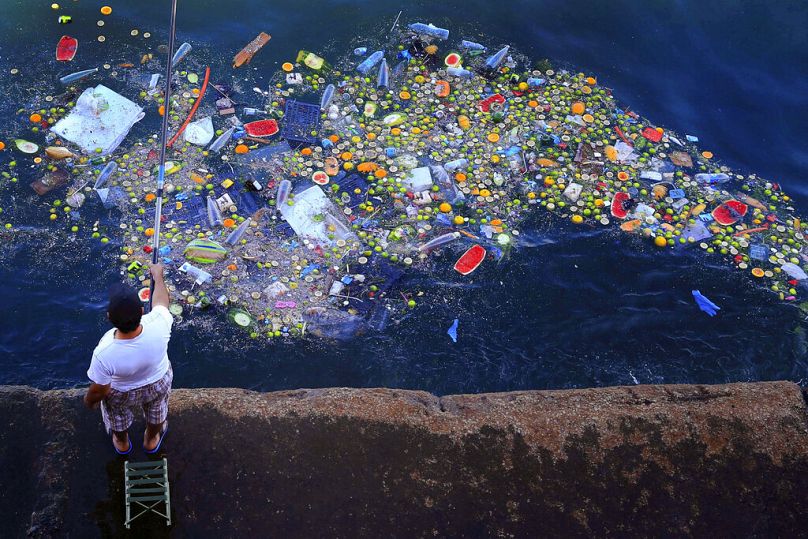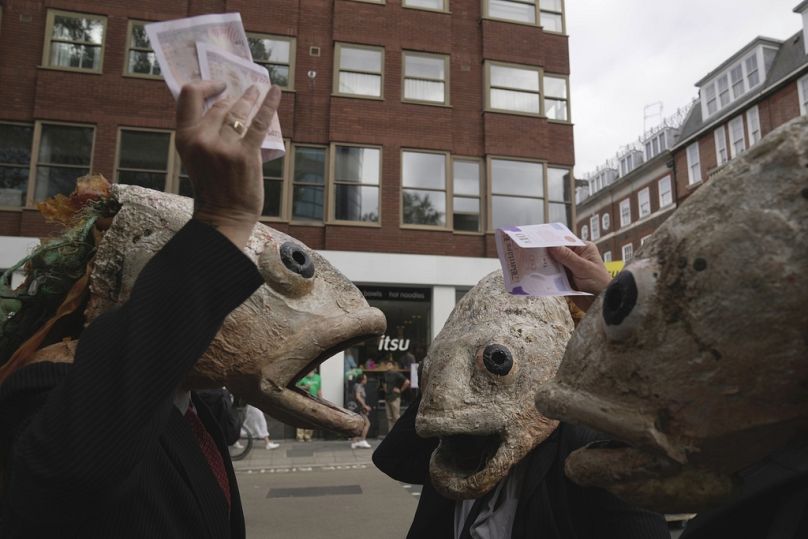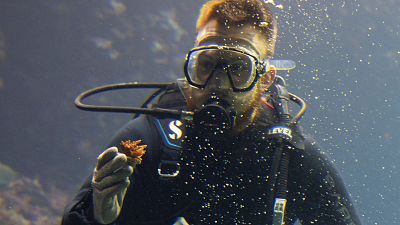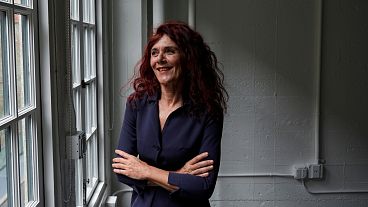It’s safe to say we put the oceans through a lot. And it takes bold action to counteract these harsh effects. Yet, there is still hope for the oceans and our planet's future, actor Ted Danson writes in a Euronews exclusive.
Ten years ago, I stood with then US Secretary of State John Kerry in the spectacular Sant Ocean Hall at the Smithsonian National Museum of Natural History in Washington, DC to discuss an issue that we both hold dear: the state of the world’s oceans.
Before that week in 2014, no one had gathered world leaders, funders, non-profits, and academics together under one roof to dedicate time to solving some of the greatest threats facing our oceans.
That all changed when Secretary Kerry created Our Ocean – an annual international conference that will meet this week, for the ninth time, in Athens, Greece.
International gatherings can be tricky and disappointing, often ending in stalemates on important decisions.
There is no kicking the can down the road at Our Ocean. There is real progress, ending each annual meeting with a healthier path forward for the oceans.
Since 2014, the Our Ocean conference has mobilized more than 2,160 commitments worth approximately $130 billion (€122.5bn) and protected more than 5 million square miles (13 million square kilometres) of ocean.
Last year’s conference in Panama culminated in 360 commitments alone, including an announcement from the government of Panama that it would protect more than 54% of its ocean.
One of my favourite announcements was at the 2016 Our Ocean conference when Sec. Kerry helped Oceana, SkyTruth, and Google unveil Global Fishing Watch to the world — a first-of-its-kind technology platform that enables anyone to see and track the activity of commercial fishing vessels in near real-time — for free.
Global Fishing Watch is now working to map all human activity at sea. What a powerful tool.
Overfished and overburdened
These commitments are essential because our oceans are up against many threats. Half of global fisheries are overfished and another 40% are fished to maximum levels.
Illegal, unreported, and unregulated fishing is also a dire threat that depletes ocean resources, destroys habitats, and has even been tied to forced labour and other human rights abuses.
Nearly 33 billion pounds (15 billion kilogrammes) of plastic pollution enter the oceans every year — equivalent to dumping two garbage trucks full of plastic into the oceans every minute.
The oceans have also borne the brunt of climate change, absorbing over 90% of all the excess heat trapped on Earth, contributing to a slew of impacts like coral bleaching, warming ocean temperatures, and sea level rise.
It’s safe to say we put the oceans through a lot. And it takes bold action to counteract these harsh effects. Fortunately, Our Ocean is where we can chart a course forward.
From plastics to overfishing, our to-do is grim and long
First, world leaders must reduce greenhouse gas emissions by stopping the expansion of new offshore drilling and transitioning from fossil fuels to renewable energy.
Corporate polluters need to be held accountable for the pollution they create and the havoc it wreaks on the oceans, and that means reducing the production and use of unnecessary single-use plastics.
To rein in overfishing, governments need to establish science-based management plans and catch limits at the national level.
But if we want to save the oceans and help feed the world, it’s not just about who catches the most fish but also who needs fish the most. We must ensure that local catch is supporting local people and not being turned into food for pigs or farmed salmon.
We must also continue to make progress toward the global commitment to protect 30% of our oceans by 2030, an ambitious goal that will preserve ocean biodiversity for future generations.
In doing so, we should ensure these protected areas ban destructive activities like bottom trawling, which can bulldoze the seafloor.
Worldwide victories are happening
While these might seem like monumental undertakings, in just the last year we’ve seen so many victories for our oceans, including the creation of several new marine protected areas (MPAs) such as the Bajos del Norte National Park in the Gulf of Mexico, a new MPA protecting Chile’s iconic Humboldt archipelago, and two new MPAs right here in the Mediterranean.
Belize passed a historic “People Power” law that requires any decision to open its ocean to oil and gas drilling to first be voted on by the Belizean people through a national referendum.
The European Union increased transparency at sea, creating a new database that discloses the activities of EU vessels fishing outside of EU waters.
The EU also now requires all its fishing vessels, including 49,000 small-scale vessels, to have tracking systems.
And with their new sanction system, the General Fisheries Commission for the Mediterranean can now penalize States that fail to tackle overfishing or illegal fishing by their fleets.
A new law in Peru strengthened protections for the first five nautical miles of its entire coast (one of the most productive ocean areas in the world) that is reserved exclusively for artisanal fishers.
And in Brazil, following a 2018 law spearheaded by artisanal fishers, the Supreme Court upheld a ban on bottom trawling along the coast of the southern state of Rio Grande do Sul, where more than 20,000 families rely on artisanal fishing for their livelihoods.
This is only a short list of recent accomplishments from around the world.
I would like to thank Secretary Kerry for being a catalyst for the wave of ocean action in the last 10 years since the first Our Ocean conference. His vision for a restored, healthy ocean helped bring the world together to tackle these challenges head-on.
If there’s one thing I’ve learned from him, it’s that there is still hope for the oceans and for the future of our planet. The world could use more leaders like him today.
Ted Danson is an award-winning actor and a board member of Oceana.
At Euronews, we believe all views matter. Contact us at view@euronews.com to send pitches or submissions and be part of the conversation.
